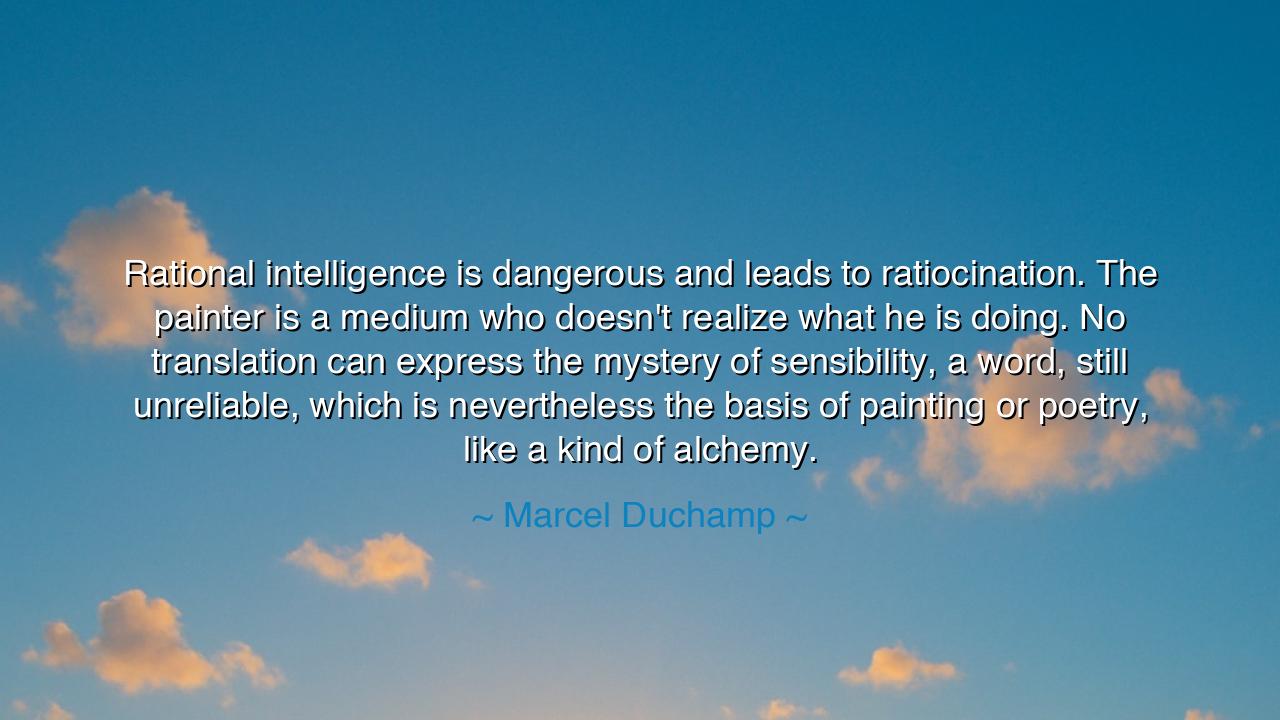
Rational intelligence is dangerous and leads to ratiocination.
Rational intelligence is dangerous and leads to ratiocination. The painter is a medium who doesn't realize what he is doing. No translation can express the mystery of sensibility, a word, still unreliable, which is nevertheless the basis of painting or poetry, like a kind of alchemy.






The words “Rational intelligence is dangerous and leads to ratiocination. The painter is a medium who doesn’t realize what he is doing. No translation can express the mystery of sensibility, a word, still unreliable, which is nevertheless the basis of painting or poetry, like a kind of alchemy” were spoken by Marcel Duchamp, the revolutionary artist and philosopher who sought to free art from the prison of reason. In this profound and enigmatic declaration, Duchamp unveils a truth that transcends the canvas—a truth about the nature of creation itself. He warns that rational intelligence, though useful in the mechanical world, becomes dangerous when it invades the realm of the spirit, for it transforms art into calculation and beauty into formula. His words remind us that the deepest acts of creation do not arise from thought, but from mystery, from that ineffable force the ancients called inspiration, and which Duchamp likens to alchemy—the sacred art of turning matter into spirit.
To grasp his meaning, one must first understand the rebellion that gave birth to his words. Duchamp lived in the age of modernity, when machines began to dominate human life, and science sought to quantify all things—even beauty. Against this tide of rationalism, he stood as a heretic, declaring that art is not the product of logic, but of intuition. When he said that the painter is a medium, he meant that the artist is not the master of his creation, but the vessel through which unseen forces flow. Just as the prophet speaks words not of his own choosing, so the true painter paints what the universe whispers through him. It is a sacred state of unknowing, where creation happens not by design, but by grace.
When Duchamp condemns ratiocination—the endless reasoning that dissects and explains—he speaks against the tyranny of intellect over imagination. To ratiocinate is to analyze until wonder dies. In this, Duchamp’s words echo the wisdom of the ancients: Heraclitus, who taught that the hidden harmony of the world is more powerful than the visible one; or Lao Tzu, who said, “The Tao that can be spoken is not the eternal Tao.” The moment we try to explain beauty, we destroy it. The moment we analyze poetry, we lose the music within it. Thus, Duchamp warns the artist: guard against the mind’s desire to control. For creation lives not in the head, but in the heart—in that fragile, sacred mystery of sensibility that cannot be taught, cannot be translated, cannot be reasoned into existence.
This “mystery of sensibility”—this subtle awareness that perceives truth beyond words—is, to Duchamp, the soul of all art. It is the trembling of intuition, the whisper that tells the poet which word to write, the painter which color to choose, the composer which note to strike. It is not intelligence but sensitivity, not calculation but feeling, that gives art its divine power. Like the alchemists of old who sought to transmute base metals into gold, the artist transforms the mundane into the miraculous through this hidden power. The brush, the pen, the chisel—these are merely tools; it is sensibility that turns them into instruments of revelation.
Consider Vincent van Gogh, the mad visionary whose paintings radiate the pulse of the soul. He did not paint through reason—he painted through fire. His swirling skies, his trembling fields, his burning stars were not products of logic but of transcendence. He could not explain what he was doing, nor did he need to. His hand was guided by that same alchemical force Duchamp describes—the mysterious union of suffering, faith, and perception that gives birth to art. The world dismissed him as insane because it could not measure his sensibility. Yet today, his works speak with the voice of eternity, proving Duchamp’s truth: rational intelligence can describe the world, but only sensibility can reveal its soul.
Duchamp’s warning also extends beyond art into life itself. For life, too, is an act of creation. When men and women live only by logic—when they measure worth by numbers, emotions by efficiency, and dreams by practicality—they become less human. To live fully, one must sometimes abandon control, trust instinct, and embrace the unknown. The most beautiful lives, like the greatest paintings, are not planned—they are discovered. The same alchemy of sensibility that transforms a blank canvas into art can transform an ordinary life into meaning.
So, O seeker of truth, take heed of Duchamp’s words. Do not worship reason as your only god, for it will blind you to wonder. Use your intelligence as a tool, but let your sensibility lead the way. When you create, do not strive to understand—strive to feel. When you live, do not seek perfection—seek authenticity. Trust the mystery within you, that sacred current that speaks not in logic but in symbols, emotions, and dreams. For it is there, in the quiet spaces beyond reason, that the true artist—the true human being—finds the divine.
And remember always that art, like life, is a kind of alchemy. It is not about knowing, but about becoming. It is not about explaining, but about awakening. As Duchamp teaches, the miracle of creation begins when we stop trying to control the process and allow the unseen to work through us. For reason builds, but sensibility transforms—and in that transformation lies the eternal gold of the spirit.






AAdministratorAdministrator
Welcome, honored guests. Please leave a comment, we will respond soon